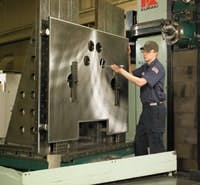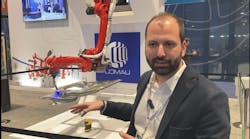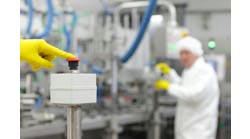Outsourcing has become a dirty word, with connotations of cheap labor and environmentally unfriendly facilities.
But in Milwaukee, Allis Tool & Machine Corp. is building custom machines and a reputation as a company that knows its core competencies and sticks to what it does best.
We have a job-shop mentality, says President Bill York. Were customer-driven. Its a competitive, high-risk market because we dont have that much repeat work, so what you see coming in will be gone and what replaces it will be different. There is some commonality. Theres a certain amount of mechanics so were a large tool room with large equipment, but we dont have a specific industry for our design-and-build.
Forty-four years after the company was founded, York and some investors bought Allis Tool in 1997 because of the potential they saw. It was a machine shop doing tool-room-quality work, says York. I saw that we could do bigger dies. We took museum-quality equipment and brought it into competition with world-class machine shops.
With three engineers, all mechanical, of staff, Allis Tool has done work for a lot of industriesfrom health care to motorcyclesbut the jobs York prefers have intricate machining associated with design and build. Those are the jobs that will require machining skill sets here at Allis Tool, he says.
We contract out the controls, explains York. Its generally customer-specified. Our approach with our customers is very collaborative. Some people want Allen-Bradley. Other times they say, Heres the box. Go and invent it and tell us what it is. We deal with engineers, physicists and scientists. Sometimes, they know what they want, and they provide us with a scope and the schematics. In other cases, we have to build the scope for them and then they sign off on it.
That kind of collaboration with customers means including control integrators in the design process. Allis Tool works with a variety of integrators, primarily in the Milwaukee area.
One of them, Industrial Technical Services, specializes in custom machines, which aligns with Allis Tools area of expertise.
HOLD IT TOGETHER
Buddy Bree checks bore diameters on side plates of Allis Tools Kuraki, a large CNC horizontal milling machine capable of holding parts that weigh up to 7,000 lb. Allis recently installed a Toyoda CNC vertical that can accommodate up
to 22,000 lb.
Source: Allis Tool & Machine
Because Allis Tool has no product line, per se, it helps its customers to pioneer what they need through those collaborative efforts. Sometimes they dont know what they need, so we can introduce bits and pieces of our experience, explains York. We dont want a product line. We dont want repetitiveness. In our precision tool-room facility, we build very precise components for everything from medical to mining and rubber molding industries.
ITS approaches its domain expertise similarly. We must understand the whole machine, including its intended environment, and all the mechanisms within, so that we can choose an appropriate controller, says Hetzel.
When the machine is complete and delivered, nobody has been more intimate with it than the controls people, especially the programmer. Getting the controls people involved early is imperative to a happy ending.
Because of its custom approach and its expertise in prototypes, Allis Tool finds a great deal of work in health care. For example, we design and build the handling equipment for a large health-care MRI provider, explains York. We also deal with vacuum, heat and timing. We get into some very complex controls, which we contract out. In the health-care industry, we might build the first prototype. Then were in a position where theyll go out for competitive production equipment bids. We know what our costs are, so well know if we can play or if we need to walk away.
No matter the industry, Allis Tool finds that satisfied customers beget new business. One of its customers, Humane Manufacturing of Janesville, Wis., sells 4-by-4-ft rubber cow mats. Ergonomic mold issues needed to be addressed, says York. We automated that. Now were helping them refine their process, and the second phase will be delivery of raw materials. Its a four-year plan for revamping their plant from a manual to an automated environment. An important part of the investment will be training and reeducating those individuals from manual labor skills to working with automated controls where they look at monitors and screens and react.
Like most machine builders, Allis Tool sees an increasing number of requests for data-acquisition capabilities.
DAQ is becoming much more prevalent, admits York. More companies want it for testing and inspection stations prior to shipping parts out. For Case New Holland, we built a test stand that takes and registers all of the data of 18 functions on a PTO that goes on the back of the tractor. When it leaves the factory, it registers what those 18 functions were doing.
PC Vs. Programmable Controller
And rarely in a manufacturing facility will you find a maintenance person comfortable with C++, or VB or any other PC programming environment. We sometimes are asked to acquire and store unit data or part number parameters, and we use PCs in these applications. Today almost everyone has Ethernet on the shop floor, so more and more we able to keep the PCs out of the manufacturing environment by working with the plant IT people to put components on their network. This has the added advantage that, if the IT people will allow, we can remotely access the machine controls for maintenance, troubleshooting and updates.
Gordon Hetzel, president of Industrial Technical Services, believes that no one is more intimate with a machine than the controls people. He suggests asking these intimate questions during the design phase to avoid risking late delivery and poor machine performance, as well as operator and maintenance safety issues.
- What does the machine do?
- What are the mechanisms?
- What provisions for operator and maintenance safety are required (requires familiarity with agency guidelines)?
- Are servos required?
- Are variable speed drives required?
- What size motors?
- What are power supply capacities?
- Ambient temperatures?
- Dirty environment?
- Maintenance capabilities?
- Data collection?
- Preconceptions?
- Who supplies which components?
- Project schedule?
- Special agency requirements (once the controls are built, it is too late to add UL or CE or other requirements)?
Sponsored Recommendations

Leaders relevant to this article:





